Discover the Top 10 Language Learning Startups in India that are revolutionizing the way people learn new languages. From innovative apps to immersive experiences, explore how these startups are making language acquisition easier and more engaging than ever before.
1.Duolingo
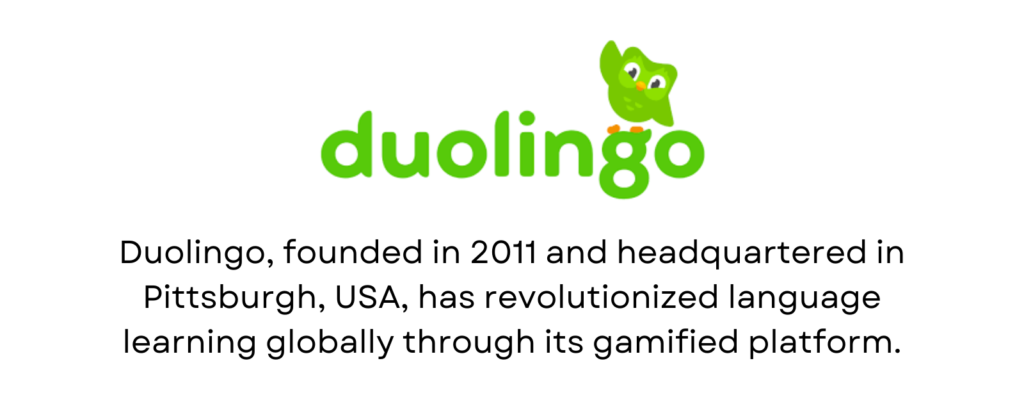
Duolingo, founded in 2011 and headquartered in Pittsburgh, USA, has revolutionized language learning globally through its gamified platform. Available in multiple languages including Hindi and English, Duolingo offers interactive lessons and quizzes that make learning engaging and accessible. With over $183.3 million in funding as of 2023, it continues to expand its user base worldwide by providing a free and premium subscription model. The platform’s effectiveness lies in its adaptive learning algorithm that adjusts difficulty based on user performance, ensuring personalized learning experiences. Duolingo also offers a mobile app that allows users to learn on the go, making it a convenient choice for language learners of all ages.
| Details | Description |
|---|---|
| Website | Duolingo |
| Founded | 2011 |
| Location | Pittsburgh, USA |
| Funding | $183.3 million (as of 2023) |
| Key Feature | Gamified learning experience |
2.Hello English
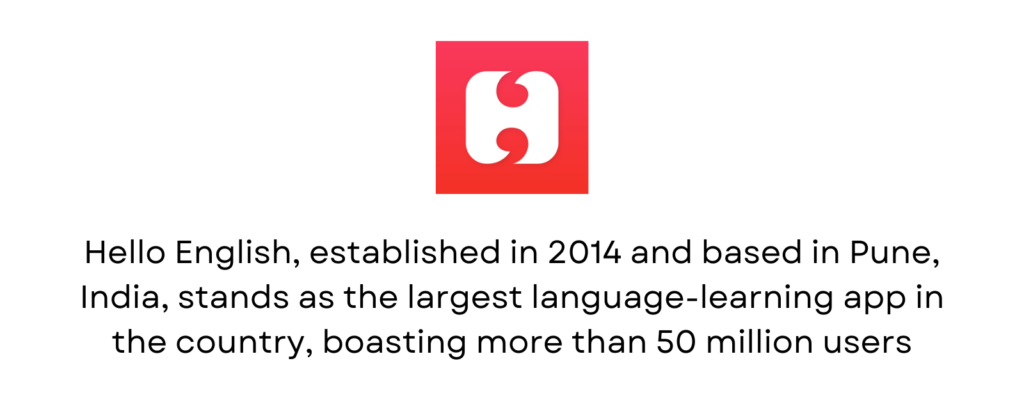
Hello English, established in 2014 and based in Pune, India, stands as the largest language-learning app in the country, boasting more than 50 million users. The app offers courses in languages such as English and Hindi, catering to diverse proficiency levels with personalized lessons, quizzes, and interactive exercises. With $20 million in funding as of 2021, Hello English utilizes adaptive learning techniques to tailor content based on individual progress. It is known for its user-friendly interface and offline mode, allowing users to learn anytime, anywhere. Hello English also fosters community engagement through social features, making language learning a collaborative experience.
| Details | Description |
|---|---|
| Website | Hello English |
| Founded | 2014 |
| Location | Pune, India |
| Funding | $20 million (as of 2021) |
| Key Feature | Adaptive learning based on user proficiency |
3.CultureAlley (HelloTalk)
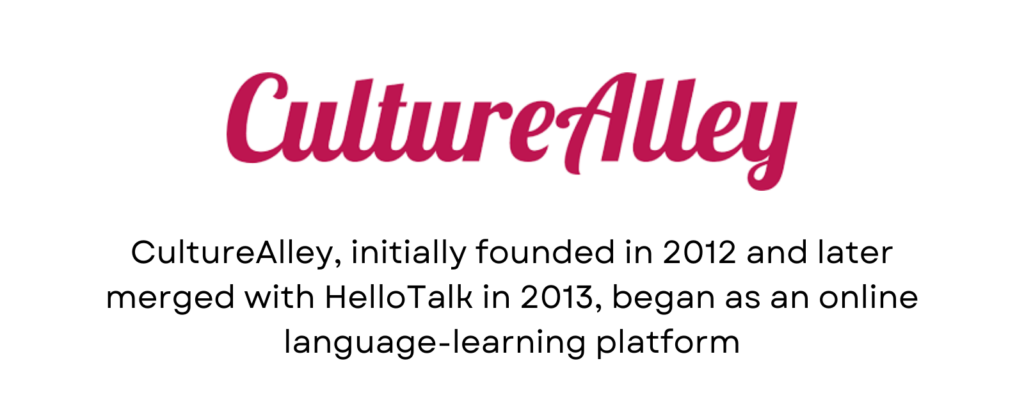
CultureAlley, initially founded in 2012 and later merged with HelloTalk in 2013, began as an online language-learning platform based in Jaipur, India. HelloTalk has evolved into a global language exchange community, enabling users to practice languages with native speakers through text, voice messages, and video calls. This platform facilitates real-world language immersion and cultural exchange, enhancing language skills through practical interaction. HelloTalk’s undisclosed funding underscores its focus on user engagement and community-driven learning, appealing to individuals seeking authentic language practice beyond traditional classroom settings.
| Details | Description |
|---|---|
| Website | HelloTalk |
| Founded | 2012 (CultureAlley); 2013 (HelloTalk merger) |
| Location | Jaipur, India |
| Funding | Undisclosed |
| Key Feature | Language exchange with native speakers |
4.Lingua.ly
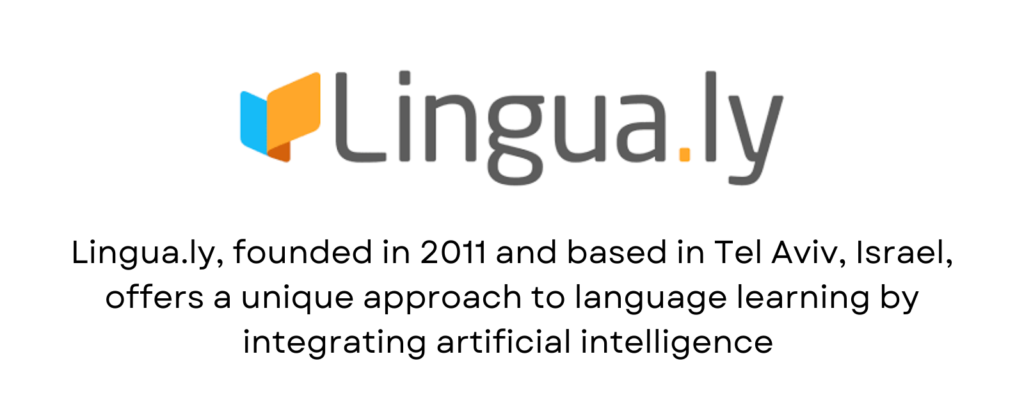
Lingua.ly, founded in 2011 and based in Tel Aviv, Israel, offers a unique approach to language learning by integrating artificial intelligence with real-world content from the web. This platform helps users learn languages through personalized lessons and vocabulary practice based on their interests and proficiency levels. With $4 million in funding as of 2016, Lingua.ly focuses on adaptive learning, ensuring that users receive tailored language lessons that adapt to their learning pace and preferences. Its emphasis on authentic content enhances language retention and application, making it a preferred choice for self-directed learners globally.
| Details | Description |
|---|---|
| Website | Lingua.ly |
| Founded | 2011 |
| Location | Tel Aviv, Israel |
| Funding | $4 million (as of 2016) |
| Key Feature | AI-driven language learning with real-world content |
5.Rosetta Stone
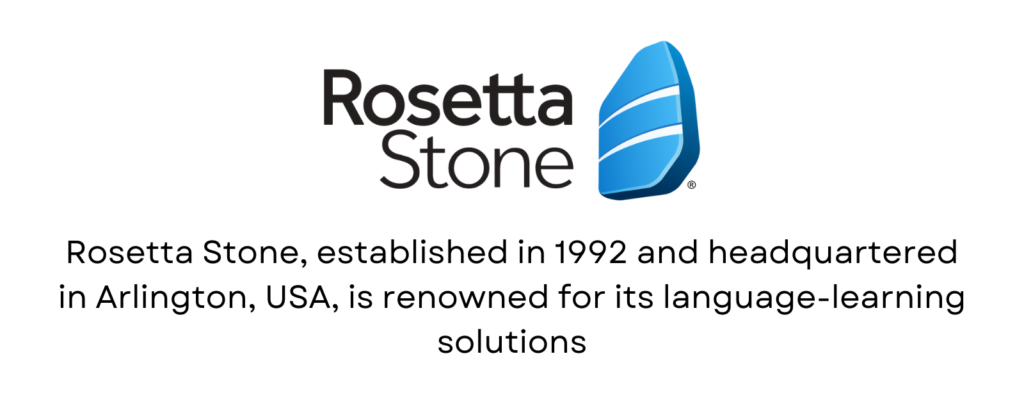
Rosetta Stone, established in 1992 and headquartered in Arlington, USA, is renowned for its language-learning solutions that encompass software, online courses, and mobile apps. Offering courses in multiple languages, Rosetta Stone focuses on immersive learning techniques to develop language proficiency. Acquired by Cambium Learning Group in 2018, Rosetta Stone continues to innovate with its language immersion approach, catering to both individual learners and institutions globally. Its funding history reflects a commitment to enhancing language education through technological advancements and adaptive learning methodologies, ensuring effective language acquisition across diverse learner demographics.
| Details | Description |
|---|---|
| Website | Rosetta Stone |
| Founded | 1992 |
| Location | Arlington, USA |
| Funding | Acquired by Cambium Learning Group (2018) |
| Key Feature | Immersive language learning techniques |
6.FluentU
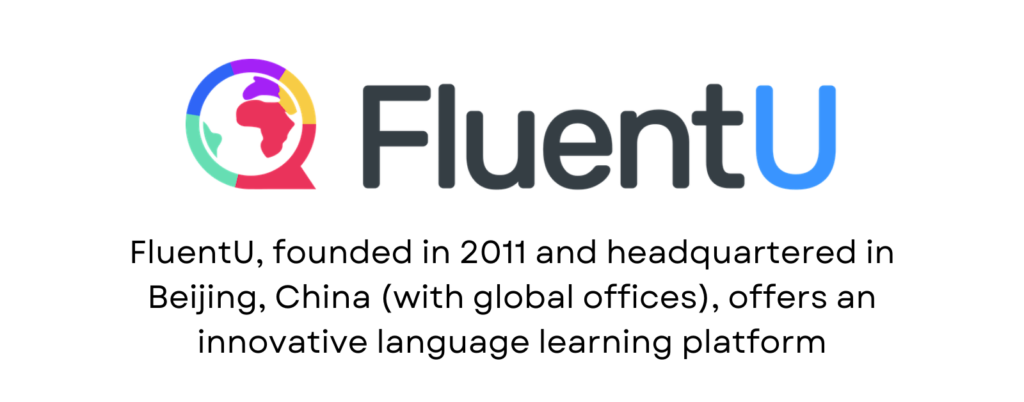
FluentU, founded in 2011 and headquartered in Beijing, China (with global offices), offers an innovative language learning platform focused on real-world videos. It provides interactive captions and quizzes based on authentic content like movie trailers and news, enhancing language acquisition through contextual learning. With $15 million in funding as of 2016, FluentU emphasizes language immersion and practical usage, making it suitable for learners seeking to develop conversational skills in various languages.
The platform’s emphasis on authentic content and interactive learning methods has garnered it a strong user base globally, particularly among those who prefer learning through multimedia and real-life contexts. FluentU’s approach not only enhances vocabulary retention but also improves comprehension and cultural understanding, enriching the overall learning experience.
| Details | Description |
|---|---|
| Website | FluentU |
| Founded | 2011 |
| Location | Beijing, China (global offices) |
| Funding | $15 million (as of 2016) |
| Key Feature | Learning languages through authentic videos |
7.Babbel
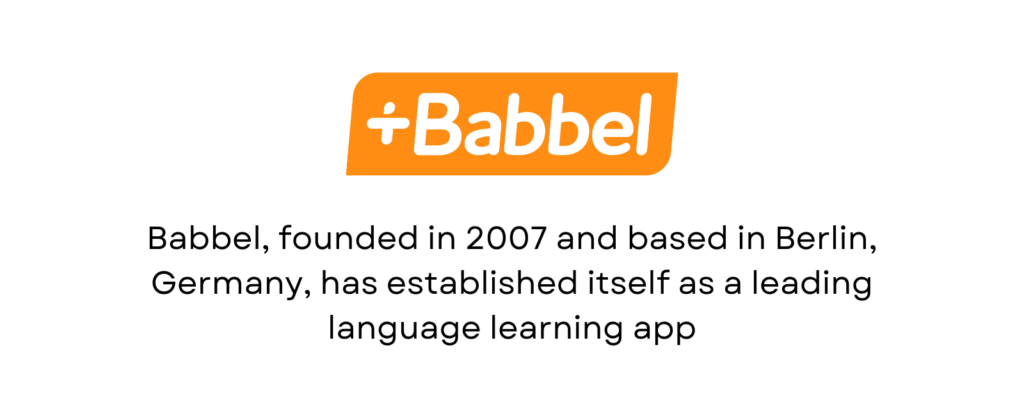
Babbel, founded in 2007 and based in Berlin, Germany, has established itself as a leading language learning app that offers comprehensive courses in 14 languages. The platform is renowned for its commitment to enhancing practical conversation skills through a combination of interactive lessons, targeted grammar exercises, and extensive vocabulary practice. With a substantial funding of $33 million as of 2020, Babbel has continuously evolved to meet the needs of its users, providing structured language learning programs that prioritize real-world applications and the development of language proficiency in authentic contexts. Its user-centric approach and innovative methodologies make it a preferred choice for individuals seeking effective and engaging ways to learn languages beyond traditional classroom settings.
| Details | Description |
|---|---|
| Website | Babbel |
| Founded | 2007 |
| Location | Berlin, Germany |
| Funding | $33 million (as of 2020) |
| Key Feature | Focus on practical conversation skills |
8.Memrise

Memrise, founded in 2010 and headquartered in London, UK, stands out for its innovative approach to language learning, leveraging advanced techniques such as spaced repetition and mnemonic devices. The platform’s methodical use of these strategies facilitates efficient vocabulary acquisition and retention, ensuring learners can recall and apply language skills effectively. Offering a wide range of language courses, Memrise tailors its content to accommodate diverse learning styles, providing personalized learning paths that cater to individual needs and preferences. With a substantial funding of $22.5 million as of 2018, Memrise has continued to enhance its offerings, focusing on practical language application and fostering a deep understanding of linguistic nuances. This commitment to user-centric education has cemented Memrise’s reputation as a trusted resource for language learners worldwide, empowering them to achieve fluency with confidence and proficiency.
| Details | Description |
|---|---|
| Website | Memrise |
| Founded | 2010 |
| Location | London, UK |
| Funding | $22.5 million (as of 2018) |
| Key Feature | Spaced repetition and mnemonic techniques |
9.Busuu
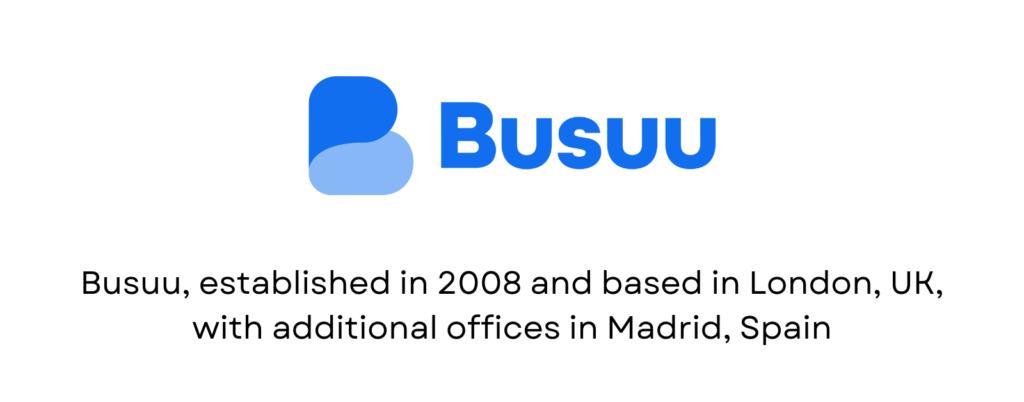
Busuu, established in 2008 and based in London, UK, with additional offices in Madrid, Spain, is renowned for its comprehensive language learning courses available in 12 languages. The platform distinguishes itself through interactive lessons, rigorous grammar exercises, and valuable feedback from native speakers, all facilitated through its vibrant community-driven approach. With a significant funding of $24 million as of 2021, Busuu is dedicated to enhancing language proficiency by immersing learners in real-life scenarios and promoting cultural understanding. This emphasis on practical language skills has solidified Busuu’s popularity among individuals seeking effective and relevant language education that goes beyond mere vocabulary acquisition. As it continues to innovate and expand its offerings, Busuu remains at the forefront of empowering global learners to communicate confidently and competently in diverse linguistic contexts.
| Details | Description |
|---|---|
| Website | Busuu |
| Founded | 2008 |
| Location | London, UK (with offices in Madrid) |
| Funding | $24 million (as of 2021) |
| Key Feature | Community-based language practice |
10.Verbling
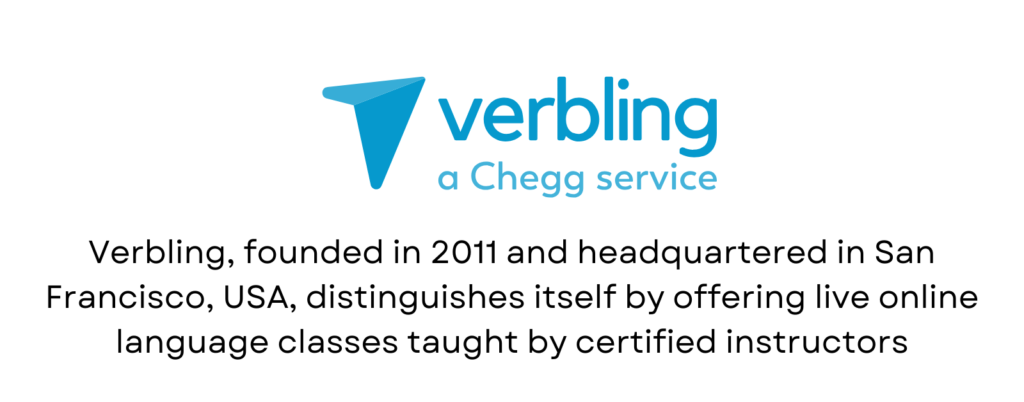
Verbling, founded in 2011 and headquartered in San Francisco, USA, distinguishes itself by offering live online language classes taught by certified instructors. Supporting over 50 languages, Verbling provides personalized lessons, constructive feedback, and flexible scheduling options to cater to users striving to enhance their language skills. With a funding of $5.6 million as of 2017, Verbling places a strong emphasis on real-time interaction and customized learning experiences. This approach ensures that learners receive structured language education through live instruction, facilitating effective communication and cultural understanding across diverse linguistic backgrounds. Verbling’s commitment to quality instruction and innovative online learning tools continues to attract individuals seeking dynamic and engaging language learning experiences worldwide.
| Details | Description |
|---|---|
| Website | Verbling |
| Founded | 2011 |
| Location | San Francisco, USA |
| Funding | $5.6 million (as of 2017) |
| Key Feature | Live online classes with qualified teachers |
FAQs on language learning startups in India
Q1: What are language learning startups?
A1: Language learning startups are companies that leverage technology to provide innovative solutions for learning languages. These startups often offer mobile apps, online platforms, or software that use interactive methods, AI, and personalized learning techniques to help users acquire proficiency in different languages.
Q2: Why are language learning startups important?
A2: Language learning startups are important because they democratize access to language education. They make learning languages more accessible, engaging, and flexible, catering to diverse learner needs and preferences. Additionally, they often offer cost-effective alternatives to traditional language classes and can reach a global audience.
Q3: What types of features do language learning startups offer?
A3: Language learning startups offer a range of features, including:
- Interactive lessons and quizzes
- Adaptive learning algorithms that adjust to individual learning speeds
- Gamification elements to make learning fun and engaging
- Real-world content integration (videos, articles) for contextual learning
- Language exchange platforms for practicing with native speakers
- Progress tracking and personalized feedback
Q4: How do language learning startups differentiate themselves?
A4: Language learning startups differentiate themselves through:
- Unique teaching methodologies (e.g., gamification, immersion)
- Focus on specific languages or proficiency levels
- Integration of AI and machine learning for personalized learning experiences
- Community features for peer interaction and language exchange
- Accessibility across devices (mobile, desktop) and offline capabilities
Q5: Are language learning startups effective?
A5: Yes, language learning startups can be highly effective. They often incorporate scientifically-backed methods like spaced repetition, immersion, and gamification, which enhance retention and motivation. Effectiveness may vary based on individual learning styles and consistency of use, but many users find these platforms valuable for achieving language proficiency goals.
Q6: What are some popular language learning startups in India?
A6: Some popular language learning startups in India include:
- Duolingo
- Hello English
- CultureAlley (HelloTalk)
- Lingua.ly
- FluentU
- These startups offer diverse approaches to language learning, catering to different languages, learning styles, and educational goals.
Q7: How can I choose the right language learning startup for me?
A7: When choosing a language learning startup, consider factors such as:
- Your language goals (conversation, reading, writing, etc.)
- Preferred learning style (interactive, structured, self-paced)
- Availability of courses in the languages you want to learn
- User reviews and ratings for the platform’s effectiveness
- Features offered (e.g., real-world content, community support)
- Pricing model (free vs. paid, subscription options)
Q8: Are language learning startups suitable for beginners?
A8: Yes, many language learning startups cater to beginners by offering introductory courses, basic vocabulary lessons, and gradual skill-building exercises. They often provide intuitive interfaces and supportive features to help new learners start their language learning journey effectively.
Q9: How do language learning startups ensure quality in their courses and instruction?
A9: Language learning startups prioritize quality by employing certified instructors, developing curriculum based on linguistic research, and incorporating user feedback into course updates. Many platforms also offer trial periods or free lessons to allow users to experience their teaching methods before committing to a subscription.
Q10: Are language learning startups suitable for children and young learners?
A10: Yes, many language learning startups offer specialized programs designed for children and young learners, featuring engaging and age-appropriate content such as games, songs, and interactive lessons. These platforms often incorporate parental controls and progress tracking to support learning at different developmental stages.
Conclusion:
Language learning startups are revolutionizing global communication by leveraging technology to make language acquisition accessible and engaging. Duolingo leads the pack with its gamified approach and extensive language offerings. Babbel and Rosetta Stone provide structured courses with a focus on practical conversation skills. Busuu and Memrise emphasize community-based learning and real-life context. HelloTalk and Tandem facilitate language exchange with native speakers. Lingvist and Drops use AI and visualization techniques to enhance vocabulary retention. Preply and iTalki offer personalized tutoring sessions. These startups are breaking language barriers, fostering cross-cultural communication, and making language learning more personalized and effective.
Also read:
Top 10 HealthTech Startups in India
Top 10 Agritech Companies in India
Top 10 CleanTech Startups in India
Top 10 InsurTech Startups in India
Top 10 LegalTech Startups in India
Top 10 RetailTech Startups in India
Top 10 Fintech Startups in India
Top 10 GovTech Startups in India
Top 10 PropTech Startups in India
Top 10 FoodTech Startups in India
Top 10 Edutech Startups in India
Top 10 Mobility Startups in India
Top 10 FashionTech Startups in India
Top 10 HRtech Startups in India
Top 10 AdTech Startups in India
Last Updated on: Friday, June 21, 2024 8:02 am by Indian News Bulletin Team | Published by: Indian News Bulletin Team on Wednesday, June 19, 2024 8:23 am | News Categories: Education, Startup
